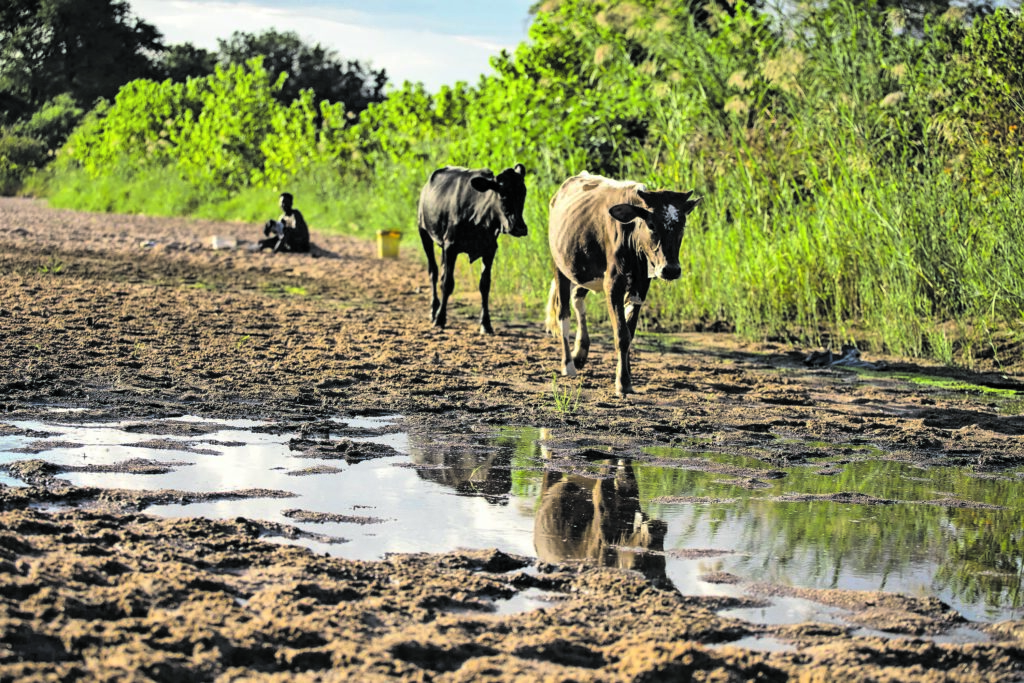Our land: A coalition of 101 civil society groups has joined in protesting Beifa Investments’ mining exploration (above), but one protester, Never Tshuma, was arrested and charged. Photo: Centre for Natural Resource Governance
The community of Dinde in northern Zimbabwe is increasing its lobbying efforts to halt a coal mining project on ancestral land that is being explored by Chinese company Beifa investments. More than 100 civil society organisations have reaffirmed their support for the Dinde community following the court appearance of Dinde Residents Association vice-chairperson Never Tshuma last week.
Tshuma appeared at the Hwange magistrate’s court on 17 June for “inciting public violence” while protesting against the proposed coal project in April. The matter was postponed to 20 July.
In September 2020, the Zimbabwean government gave Beifa 4 070 hectares of land belonging to the people of Dinde to explore coal mining and the installation of a thermal power station.
“The Dinde community — a mix of indigenous Nambya and Tonga tribes — has lived in this area since around 300AD. They have adapted to their environment and are famous for craft and cattle breeding. The area to be affected, spanning across three rural wards, is home to thousands of families,” civil society groups WoMin and the Centre for Natural Resources Government (CNRG) said earlier this year when explaining their opposition to the project.

The Action Network, a collective of civil society groups, has also called for support to stop the alleged intimidation that the community is subjected to because of its opposition to the project.
Beifa has said that it is a legitimate holder of a special grant, issued on 17 January 2020, and a valid environmental impact assessment certificate to explore or prospect in the area.
According to the charge sheet against Tshuma, the alleged incitement took place on 15 April. Beifa had erected a tent at the possible mining site to brief the community, but Tshuma told community members that the tent should be removed and mining should not take place.
“The accused went on to tell the community to remove the tent immediately. The community started to move towards the tent, shouting, saying that the tent must be removed, in support of the accused person. Police intervened and warned the accused against his actions,” the charge sheet reads.
“While at the scene, the accused person came and told the villagers to follow him and dismantle the tent. Disregarding the police presence, the villagers followed him and they walked towards the tent. The accused began to tell Beifa Investments to remove the tent before he and the villagers would take action.”
In their statement, the 101 civil society organisations said they were “deeply concerned with events unfolding in the Dinde community in Hwange district of Zimbabwe”.
The group is demanding that the government immediately halt the project, address concerns raised by the community, and stop the alleged intimidation campaigns.
They also want all charges and the case against Tshuma dropped, and have demanded that the government listens to the community’s energy and development needs in order to find alternatives to “dirty coal”.

CNRG director Farai Muguwu said the group would continue challenging the project.
“The people of Dinde have a right to say no. The people must be respected, especially their right to live on their ancestral land. We cannot allow thousands of people to be kicked out of their land, not to mention the environmental pollution risk associated with this project,” Muguwu said.
Zimbabwe minister of state affairs Richard Moyo said he was unable to comment on the matter as it was before court.
Chris Gilili is an Adamela Trust climate and economic justice reporting fellow, funded by the Open Society Foundation for South Africa